The Best Paper Award for the Marketing of Higher Education Track was presented to Helen O’Sullivan, Elvira Bolat and Chindu Sreedharan, for their work entitled Radicalising the Marketing of Higher Education: Learning from students-generated social media data.
Helen O’Sullivan presented their paper at The Academy of Marketing Conference 2016 in Newcastle last week.
/ Full archive
Jo Johnson to be quizzed on Brexit
 The House of Commons’ Science and Technology Select Committee will today (13/7/16) hold an evidence session on the implications of Brexit for science and research. Jo Johnson will be appearing before the committee alongside Professor Philip Nelson of RCUK and several senior officials from BIS. Johnson has signalled his commitment to make Brexit work for universities, and has stated that ongoing projects such as Horizon 2020 should be carrying on as normal.
The House of Commons’ Science and Technology Select Committee will today (13/7/16) hold an evidence session on the implications of Brexit for science and research. Jo Johnson will be appearing before the committee alongside Professor Philip Nelson of RCUK and several senior officials from BIS. Johnson has signalled his commitment to make Brexit work for universities, and has stated that ongoing projects such as Horizon 2020 should be carrying on as normal.
You can watch the evidence session here from 9.30am onwards.
British Academy launches interdisciplinarity report
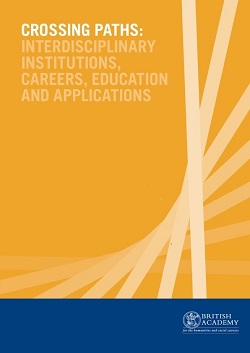 The British Academy has today published a report examining the opportunities and barriers to interdisciplinarity, from the point of view of all research career stages and institutional levels.
The British Academy has today published a report examining the opportunities and barriers to interdisciplinarity, from the point of view of all research career stages and institutional levels.
Crossing paths: interdisciplinary institutions, careers, education and applications considers support for interdisciplinary research (IDR) across the UK’s research and higher education sector, with a focus on university structures, funding, and evaluation. Case studies on interdisciplinarity at the undergraduate level and on how interdisciplinary research can influence public policy are also provided.
Finding broad and deep support for IDR, Crossing paths makes recommendations to allow researchers, including those early in their career, to pursue high quality IDR alongside, or as part of, cultivating an academic home, a secure base from which to carry out IDR.
The report is based on a call for evidence as well as roundtable discussions and visits to interdisciplinary research centres at UK universities.
Professor Roger Kain FBA, VP for Higher Education and Research at the British Academy, said:
“This report tackles an important topic at a turbulent time for the UK’s higher education sector, which is being encouraged to place an even greater emphasis on IDR. The opportunities for IDR are enormous, enabling researchers to unpick some of society’s most complex challenges and bringing greater rigour to our understanding of our own disciplines. Adopting the recommendations in this report would mitigate some of the risks that currently exist to pursuing it.”
The full report is available to download at www.britishacademy.ac.uk/interdisciplinarity
Brexit and the implications for Open Access
Whilst it’s relatively early to predict what Brexit will mean for Open Access in the UK, JISC recently released a blog post outlining the main issues that will arise from the UK’s decision to leave the EU.
The blog post raises issues around the future of EU OA policy and also funding.
At the present time, it appears the main effect of Brexit will be to create greater reliance on Green OA (usually accepted, peer-reviewed versions of outputs) rather than gold paid open access owing to fluctuating financial markets and uncertainty surrounding future European funding.
Library and Learning Support have recently created a OA support video, looking at the benefits of OA and how you can make your research OA through engaging with BRIAN and BURO.
Please contact the BURO team with any queries you may have and we will be happy to help.
Don’t forget our guide Open Access and Depositing your research
£5 million boost for next generation robotics technologies

Science Minister Jo Johnson has announced a £5 million challenge, to encourage UK companies and academics to develop robotic innovations.
The challenge will encourage UK businesses and academic institutions to work together to develop new and novel uses for robotics and autonomous systems across different industry sectors. The competition has been devised by the UK’s innovation agency, Innovate UK and the Engineering and Physical Sciences Research Council (EPSRC).
Read the news from Innovate UK here.
This competition is not yet live but is due to be launched around the week commencing 18th July and more details on it will be available then.
Why not bookmark the Live Competition list by clicking on the link below:
https://www.gov.uk/government/collections/innovation-grants-for-business-apply-for-funding
–
Aerospace research and development projects – funding announced

£365m funding announced for new UK aerospace research and development projects and major partnership with Boeing to create 2,000 jobs in the UK.
To ensure the UK’s continued position at the forefront of global aerospace, a further £365m worth of aerospace R&D projects have been approved. These are jointly funded by industry and government. These are part of the work of the Aerospace Growth Partnership which will publish a new strategy at Farnborough setting out plans to maintain the UK aerospace sector’s leading position. This includes a new supply chain competitiveness charter signed by 11 major companies across the aerospace sector.
For more on the Aerospace Strategy click here.
For more information on innovation grants for business click here.
Digital Families project video

CEMP’s project for Samsung is the subject of this video.
The Digital Families project aims to connect families with technology, enhancing digital capability in disadvantaged communities. In this video, we hear from the researchers, teachers, sponsors and families involved with this work, which is the subject of an impact case study for UoA25 at BU.
Introduction to the Research and Knowledge Exchange Development Framework
We are delighted to announce that the Research and Knowledge Exchange (RKE) development framework will launch in October 2016! 
The RKE development framework will offer a new range of opportunities for BU academics to develop their skills, knowledge and capabilities in relation to research and knowledge exchange.
Consultation with academic colleagues has been key to its development, to ensure that the opportunities to be made available match their needs and wishes. We have created an agile and flexible Framework which we trust will appeal to colleagues undertaking research and knowledge exchange activities across the University.
Look out for more information coming each week on the research blog.
ERC Deadlines
 The deadlines for the European Research Council calls are quickly approaching.
The deadlines for the European Research Council calls are quickly approaching.
Please contact Emily Cieciura, RKEO’s Research Facilitator: EU and International if you intent to apply for:
- Advanced Grant with closing date of 1st Septmber 2016
- Proof of Concept Grant with closing date of 4th October 2016
Why not sign up for ERC email alerts so that you keep up to date with ERC news and events?
Call for Gender Experts for Horizon 2020
We have received the following invitation to join the Database of Gender Experts for European Research and Innovation.
Dr. Ineke Klinge, Chair H2020 Advisory Group on Gender, invites GenPORT members (free to register) to join the H2020 database as gender experts.
 Horizon 2020 considers gender as a cross-cutting issue and it shall be adequately integrated in research and innovation content at the level of Work Programmes and projects. Applicants to Horizon 2020 calls are encouraged to include the gender dimension in their proposals. The European Commission is continuously looking for experts with gender expertise in all areas of Horizon 2020 calls to evaluate submitted research proposals.
Horizon 2020 considers gender as a cross-cutting issue and it shall be adequately integrated in research and innovation content at the level of Work Programmes and projects. Applicants to Horizon 2020 calls are encouraged to include the gender dimension in their proposals. The European Commission is continuously looking for experts with gender expertise in all areas of Horizon 2020 calls to evaluate submitted research proposals.
To find experts with relevant expertise who are willing to evaluate research proposals, the Commission uses an online database. You can register your expertise for gender, and other areas in which you wish to be considered as an expert, in this database on the Participant Portal.
It is very important that you indicate your gender expertise next to your original / main area of training and this has now become much easier than in the past. The Commission therefore encourages you to signal your gender expertise, whether you register for the first time or would like to update your expertise. In the following links you will find:
1) Criteria for gender expertise, as established by the Horizon 2020 Advisory Group on Gender, and
2) Guidance on how to signal your gender expertise in the database prepared by the Gender Sector of DG Research and Innovation.
The European Commission will greatly appreciate your cooperation in increasing the number of experts with gender expertise in its expert database.
If you are keen to know more about gender in funding and participate in this group, please register on GenPORT.
Research and Knowledge Exchange Development Framework : Pre-Award at BU
 We have previously posted about the Research and Knowledge Exchange (RKE) Development Framework. Here, we introduce another of the pathways: that focusing on the Pre-Award process when applying for funding. Please see the previous blog posts on the Development Framework for information on the separate pathways.
We have previously posted about the Research and Knowledge Exchange (RKE) Development Framework. Here, we introduce another of the pathways: that focusing on the Pre-Award process when applying for funding. Please see the previous blog posts on the Development Framework for information on the separate pathways.
The ‘Pre-Award at BU’ pathway will provide details about the information and tools that will aid BU academics applying for funding. Sessions will include details about ‘Searching for research funding’, ‘Getting started on applying for research funding’, understanding ‘Pre-award finances’ and ‘Intellectual property at pre-award’. Training will also be provided as part of this pathway for those conducting Quality and Financial approvals. More events will be added to this pathway in 2017-18 and beyond, with a focus on emerging priorties for BU.
We’ll be populating the the OD website with more information and the booking link over the coming weeks. We’ll also be providing a timetable of all events as soon as possible. In the meantime, updates will be posted on the BU research blog and the Faculty blogs.
RCUK GCRF Call for Evidence
 The Government Spending Review on 25th November 2015 announced “a new £1.5 billion Global Challenges Research Fund, to ensure UK science takes the lead in addressing the problems faced by developing countries, whilst developing our ability to deliver cutting-edge research”. The Global Challenges Research Fund is a BIS initiative which operates across a number of delivery partners, including the Research Councils, National Academies and HEFCE.
The Government Spending Review on 25th November 2015 announced “a new £1.5 billion Global Challenges Research Fund, to ensure UK science takes the lead in addressing the problems faced by developing countries, whilst developing our ability to deliver cutting-edge research”. The Global Challenges Research Fund is a BIS initiative which operates across a number of delivery partners, including the Research Councils, National Academies and HEFCE.
The RCUK Global Challenges Research Fund (GCRF) represents the largest portion of this Fund. They have launched a call for evidence to gather your views on the high-level challenges that will form the basis of the funding calls from the GCRF Collective Fund, the information gathered will also be shared with the other delivery partners so that it may inform their own strategies. They would also like your views on the most effective ways of delivering GCRF.
They are seeking inputs from individuals and institutions across all academic disciplines, non-governmental organisation and industrial sectors both in and outside of the UK.
The results from the survey will be reviewed alongside feedback from the Town Meetings. They will share a short summary of evidence they have collected and outline how that has informed their strategy in the autumn.
This call for evidence forms part of a broader programme of strategic engagement activities taking place under the GCRF programme. They will be running focus groups later this year and opening a Call for Ideas early next year to generate priority themes within each challenge.
You can complete the survey by clicking the link below. The survey closes at 16.00 on 22 August:
http://www.smartsurvey.co.uk/s/6LOJI/
Respondents are encouraged to familiarise themselves with the following background information whilst completing the survey:
FoL debate highlighted on USA website
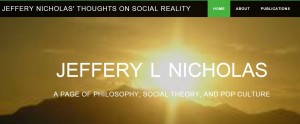 Last week’s Festival of Learning debate on the motion: “Advising pregnant women to avoid drinking alcohol during pregnancy is symptom of the Nanny State and another step towards the medicalisation of childbirth” has just been hightlighted in the USA. Our work featured on Jeffery Nicholas’ thoughts on social reality, a site established by Prof. Jeff Nicholas (click here!). Prof. Nicholas is a philospher based at Providence College with an interest in midwifery in society.
Last week’s Festival of Learning debate on the motion: “Advising pregnant women to avoid drinking alcohol during pregnancy is symptom of the Nanny State and another step towards the medicalisation of childbirth” has just been hightlighted in the USA. Our work featured on Jeffery Nicholas’ thoughts on social reality, a site established by Prof. Jeff Nicholas (click here!). Prof. Nicholas is a philospher based at Providence College with an interest in midwifery in society.
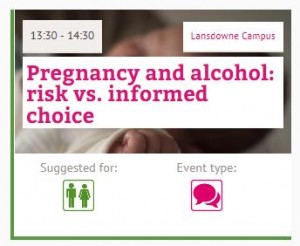
Faculty of Health & Social Sciences’ Liz Norton and Edwin van Teijlingen affiliated with the Centre for Midwifery, Maternal & Perinatal Health (CMMPH) argued in favour of the motion. Donna Wixted, Joint Bournemouth University (BU)-Portsmouth Hospitals NHS Trust, doctoral student and Greta Westwood of Portsmouth Hospitals NHS Trust & the University of Southampton argued strongly against the motion. The exciting debate was chaired by Prof. Vanora Hundley from the Faculty of Health & Social Sciences.
Presentation PhD student Jib Acharya in Liverpool
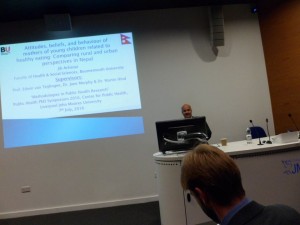 Mr. Jib Acharya (FHSS) gave an interesting presentation yesterday about the qualitative research findings of his PhD at Liverpool John Moores University. Jib’s PhD research focused on the knowledge, attitudes and beliefs of poor women in Nepal about healthy eating and the study also identifies major food barriers.
Mr. Jib Acharya (FHSS) gave an interesting presentation yesterday about the qualitative research findings of his PhD at Liverpool John Moores University. Jib’s PhD research focused on the knowledge, attitudes and beliefs of poor women in Nepal about healthy eating and the study also identifies major food barriers.
His mixed-methods approach combines a quantitative questionnaire survey with qualitative research. Jib’s research project is supervised by Dr. Jane Murphy, Dr. Martin Hind and Prof. Edwin van Teijlingen. Some of the preliminary findings of this FHSS thesis have already been published in two scientific journals [1-2].
References:
- Acharya, J., van Teijlingen, E., Murphy, J., Hind, M. (2015) Assessment of knowledge, beliefs and attitudes towards healthy diet among mothers in Kaski, Nepal, Participation 17(16): 61-72.
- Acharya, J., van Teijlingen, E., Murphy, J., Hind, M. (2015) Study of nutritional problems in preschool aged children in Kaski District in Nepal, Journal of Multidisciplinary Research in Healthcare 1(2): 97-118. http://dspace.chitkara.edu.in/jspui/bitstream/1/560/1/12007_JMRH_Acharya.
Singleimage Workshop – 2 day Finance in Horizon 2020 – 9 & 10 August 2016
2 DAY – FINANCE IN HORIZON 2020 WORKSHOP
9 & 10 August 2016 – Cambridge, UK
Horizon 2020 – the EU’s research and innovation funding programme – has been running for 2 years and projects are now beginning to submit their first financial reports. This finance workshop is an extended version of our one-day finance workshop, and will provide a greater level of detail of the funding rules for the new programme, from budgets to eligible costs and on to cash flow.
The workshop is aimed at finance and administration staff involved in EU research projects, with or without a background in earlier EU programmes. It will consist of lectures and practical exercises, to be carried out in small groups with plenary feedback sessions.
The workshop is designed to be interactive, and questions can be asked at any time. To facilitate this, attendance is limited to 24 participants.
For further information please visit the website at: www.singleimage.co.uk or contact Liz Dixon. Please also note that the nearest large airport to the workshop venue is London, Stansted.
Visible Students/Invisible Needs: a workshop
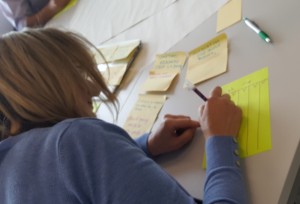 Members of the Fair Access Research project would like to invite you all to a workshop exploring issues of widening participation on Monday 11th July.
Members of the Fair Access Research project would like to invite you all to a workshop exploring issues of widening participation on Monday 11th July.
During the workshop we will engage in debates and participate in group activities as we work together to make visible the invisible needs of all of our students.
There will be a poster exhibition showcasing the variety of widening participation activities happening across the university.
The workshop is open to staff across all faculties and for professional service staff interested in this area. We want to collectively work to make the university and higher education a more equitable, more socially just place for our students, our selves and our society.
Monday 11th July 2016
10:00 -14:00
EBC 202 and 203
Lunch will be provided.
Here is our invitation. To book a place email awardrop@bournemouth.ac.uk
When it comes to impact — a woman’s work is never done

BU academic and lawyer Andrea Loux Jarman has assisted Geeta Singh, an NHS Physiotherapist in her fight to secure her daughter a full-time school place from the first day of school.
Geeta contacted Andrea after reading media coverage about an Objection Jarman had made against the admissions arrangements of St Mark’s School, Bournemouth, before the Schools Adjudicator. That adjudication forced schools across Bournemouth to either provide all pupils with a full-time place from the first day of the September term or make their part-time induction periods optional. Geeta was preparing to appear before a school complaints panel to ask them to abandon their unlawful part-time induction programme.
By way of assistance, Andrea sent her one of two articles she wrote after her case against St Mark’s.
I have just finished reading your article “Part-time Places for Reception Children”. When you gave me the advice to “teach” the Governors about the issue and its historical roots, by sending me your article you have literally thrown the means to do this in my lap. Here is an informed piece of work which I can just regurgitate. Thanks so much.
Despite the overwhelming legal authority Geeta cited in her correspondence (with official sources helpfully highlighted in red!), the school and local authority continued to attempt to pass the buck one to the other and evade responsibility for the unlawful induction period. Finding no joy with her own authority, a civil servant from another local authority wrote to her to confirm that she had correctly understood the law and suggested if her own LA wouldn’t listen to her to ask them to contact the Department for Education. This information, together with the suggestion of potential legal liability, appears to have finally persuaded the local authority to tell the school follow the law and either make their part-time induction period optional or abandon it altogether.
The Guardian will be covering the story, and Jarman will do a follow-up academic piece highlighting the implications for the rule of law when parents’ remedies for unlawful school policies in practical terms lie solely with tribunals that cannot make legal precedent that binds other schools. The absence of judicial review has meant that three-years’ on, parents are still having to fight for their right for their Reception children to attend school full time from the first day of school.
Book Launch in San Francisco
I was delighted to launch my new book ‘Pedro Zamora, Sexuality, and AIDS Education: The Autobiographical Self, Activism and the Real World’ making a presentation at the GLBT Historical Society in San Francisco. This book is the product of study leave through Fusion funding, that I worked on a little while back. At the book launch, it was wonderful that despite its been over 22 years since Pedro was last in San Francisco (and he passed a away a few months later) that so many people came to the event, and were interested in his story, including some that knew Pedro personally. Also it was flattering that representatives from the AIDS Memorial Grove attended the event that have an academic scholarship in Pedro’s name, and that I was interviewed by two journalists, including Brian Bromberger who published this review in the Bay Area Reporter.











 Fourth INRC Symposium: From Clinical Applications to Neuro-Inspired Computation
Fourth INRC Symposium: From Clinical Applications to Neuro-Inspired Computation Writing policy briefs
Writing policy briefs Upholding Excellence: The Concordat to Support Research Integrity
Upholding Excellence: The Concordat to Support Research Integrity Today’s Documentation Will Serve Tomorrow’s Justice
Today’s Documentation Will Serve Tomorrow’s Justice ECR Funding Open Call: Research Culture & Community Grant – Application Deadline Friday 12 December
ECR Funding Open Call: Research Culture & Community Grant – Application Deadline Friday 12 December MSCA Postdoctoral Fellowships 2025 Call
MSCA Postdoctoral Fellowships 2025 Call ERC Advanced Grant 2025 Webinar
ERC Advanced Grant 2025 Webinar Horizon Europe Work Programme 2025 Published
Horizon Europe Work Programme 2025 Published Horizon Europe 2025 Work Programme pre-Published
Horizon Europe 2025 Work Programme pre-Published Update on UKRO services
Update on UKRO services European research project exploring use of ‘virtual twins’ to better manage metabolic associated fatty liver disease
European research project exploring use of ‘virtual twins’ to better manage metabolic associated fatty liver disease